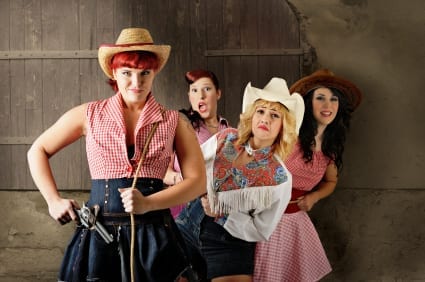Over 20 years ago, the night my first marriage ended, I spent hours dialing the phone. My husband had beaten me unconscious, I’d given statements to the police in my wrecked living room, and then I’d driven with my dog to City Hall to file a restraining order at midnight.
But when I got back home at 2 am, bruised ribs and glass cuts on my face, the first thing I did was make several calls, all of which were as important to my survival as the police, a locksmith, a divorce lawyer, and a good therapist.

I called my girlfriends. One in Chicago, another in Minneapolis, a few in California, DC, and New York. I woke each one in turn and confessed what I’d been hiding in my marital life for four years. But what those calls really did was line up my army, like King Arthur in old England summoning his most loyal knights for battle.
Even in my dazed state, I knew I couldn’t get through the next several days and months, the passionate, persuasive apologies my husband was sure to attempt, the financial challenges, the societal shaming, plus my own self doubt and twisted desire to save a destructive marriage, without my platoon of girlfriends yelling “no!” at every turn.
Rallying my girl gang felt instinctive. Turns out, it literally WAS instinct. Behavioral scientists have lately uncovered strong evidence that female friendships increase the chances of survival and reproduction, not just among humans, but among horses, mice, primates, lions, hyenas and elephants. Mutually beneficial female friendships are one key to survival in the animal, and human, kingdoms.
According to Natalie Angier of the New York Times “Science Times” section, researchers in New Zealand, Africa, and even Disney’s Animal Kingdom in Florida, believe that female affiliations are a basic building block of many animals’ social life, a strong part of why herd animals (including humans) became herd animals in the first place.
Wild mares with female friends are harassed less often by stallions; lionesses suckle their friends’ cubs; elephants rescue their pals’ drowning calves; mice with female nesting partners have more babies; monkeys, chimps and baboons form strong, stable, lifelong bonds with other females that last until death.
Some primatologists have observed that the ideal number of female friends is three. An heir and a spare, if you will. In case one cell phone is busy, you have a back up.
I’ve always hedged my bets, so it’s probably not surprising that my posse tops out around ten. This means I always have someone to call, email, or text in those moments when I’m too angry, or too distraught, to calm myself down or even speak coherently. That awful night two decades ago, I called ten women who had all seen me cry many times before. Some had been with me the first time I got drunk, the first time I got my period, the first time I attempted a ski slope that was too steep. I’d been there for them during breakups, parents’ divorces, boyfriend infidelities, job losses, suicide attempts and deaths of loved ones. Every one of them answered the phone; two even offered to drive to my apartment, hundreds of miles away, right that moment.
By the time I had finished my late night dialing, I had dug a moat around myself that neither my husband, nor my own misguided notions of marriage and loyalty, could breach. My female friends made up my own personal self-defense system. They kept me safe during the months that followed, while I took the painful, frightening actions required to rebuild my life.
Interestingly, despite libraries of studies decoding male-female sexual attraction, researchers have not yet mapped how female relationships develop. What traits do female elephants look for in friendships designed to last 60 years? How do mice decide with whom to share a nest?
For me, the test is an easy one. I look for women who never do (or say) anything mean-spirited, publicly or behind closed doors in girls’ bathrooms, bedrooms or boardrooms. (This doesn’t explain why my friends chose me, however; I’m not sure I’d pass my own niceness test.)
But these wonderful, loyal, kind, smart women have always been there when I needed them. The same friend who taught me to put on mascara is the one I called hysterically the morning my mom died. The girlfriend who saw me through my first breakup at 14 is the one who talked me off the ledge when my own father left town without telling me goodbye. A female friend suggested a good divorce lawyer, way back when. Another, more recent pal from work was the one I called a few weeks ago when my second husband, whom I’ve been married to for 17 years, told me he didn’t want to “babysit” our kids so that I could go to my high school reunion; she listened to me rant for 10 minutes before mentioning she was in line at the pharmacy because she had a vicious stomach flu. For me, this sisterhood is the true romance of my life, despite all the other kinds of delectable heterosexual entanglements I’ve also been lucky to experience.
I tell my daughters, who at ages 10 and 14 are regrettably already well-versed in mean girl dynamics, to do the same. Look over the herd. Note the girls who never nip or kick the others, no matter what. Those girls will be your lifelong gang, the ones whose midnight calls you always answer, the ones you call in the middle of the night when you need someone to pick up the phone.





